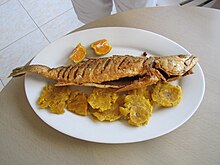Cilus
| Cilus | |
|---|---|

| |
| Corvina | |
| Scientific classification | |
| Domain: | Eukaryota |
| Kingdom: | Animalia |
| Phylum: | Chordata |
| Class: | Actinopterygii |
| Order: | Acanthuriformes |
| Family: | Sciaenidae |
| Genus: | Cilus Delfin, 1900 |
| Species: | C. gilberti
|
| Binomial name | |
| Cilus gilberti (C. C. Abbott, 1899)
| |
| Synonyms[2] | |
| |

Cilus is a monospecific genus of marine ray-finned fish belonging to the family Sciaenidae, the croakers and drums. Its only species is Cilus gilberti, the corvina or corvina drum, which is found mostly tropical to temperate coastal waters of the southeastern Pacific along Central and South America. The corvina is highly prized in South America as a food fish.[2]
Taxonomy
[edit]Cilus was first proposed as a monospecific genus in 1900 by the Chilean ichthyologist Federico Teobaldo Delfin when he described Cilus montti, which had a type localities given as Talcahuano, San Vicente and Concepción, Chile, as its only species. It was later established that Delfin's species was a synonym of Charles C. Abbott's Sciaena gilberti which Abbott had described in 1899 from Callao in Peru.[3][4] This taxon belongs to the family Sciaenidae in the order Acanthuriformes.[5]
Etymology
[edit]Cilus is derived from cilonus which means "one with a long and narrow head", an allusion to the long and compressed head of this species. The fish was given the species name gilberti by Charles Conrad Abbott, in honour of “friend and instructor” Charles Henry Gilbert.[6]
Description
[edit]The corvina is similar in appearance to its relatives the weakfish and spotted seatrout. Its body is blue-grey on top, silvery overall with small scales, and is elongated and somewhat compressed in shape.[7] It has a large mouth and a dorsal fin that is deeply notched between spiny and soft parts. It reaches 40 cm (16 in) or more.[7]
Range and habitat
[edit]The corvina is found along the South American Pacific coastline from Chile to Panama,[8] and also in the Galapagos.[7] It inhabits soft bottoms at a depth of 5 to 50 m (16 to 164 ft).[citation needed]
Culinary uses
[edit]The corvina has a white and flaky texture and a mild, sweet taste. Cooking methods include grilled, baked, fried, and sashimi. It is a popular choice in ceviche.[9][10]
References
[edit]- ^ Chao, L.; Robertson, R. & Bearez, P. (2020). "Cilus gilberti". IUCN Red List of Threatened Species. 2020: e.T183478A130860318. doi:10.2305/IUCN.UK.2020-2.RLTS.T183478A130860318.en. Retrieved 25 April 2023.
- ^ a b Froese, Rainer; Pauly, Daniel (eds.). "Cilus gilberti". FishBase. February 2023 version.
- ^ Eschmeyer, William N.; Fricke, Ron & van der Laan, Richard (eds.). "Genera in the family Sciaenidae". Catalog of Fishes. California Academy of Sciences. Retrieved 25 April 2023.
- ^ Eschmeyer, William N.; Fricke, Ron & van der Laan, Richard (eds.). "Species in the genus Cilus". Catalog of Fishes. California Academy of Sciences. Retrieved 25 April 2023.
- ^ Nelson, Joseph S.; Grande, Terry C.; Wilson, Mark V. H. (2016). Fishes of the World (5th ed.). Hoboken: John Wiley and Sons. doi:10.1002/9781119174844. ISBN 978-1-118-34233-6.
- ^ Christopher Scharpf & Kenneth J. Lazara (19 December 2024). "Order ACANTHURIFORMES (part 5): Family SCIAENIDAE". The ETYFish Project Fish Name Etymology Database. v. 3.0. Christopher Scharpf and Kenneth J. Lazara. Retrieved 2 January 2025.
- ^ a b c Jack Stein Grove; Robert J. Lavenberg (1997). The Fishes of the Galapagos Islands. Stanford University Press. pp. 423–. ISBN 978-0-8047-2289-6.
- ^ Edmundo Murray (2015). A Symphony of Flavors: Food and Music in Concert. Cambridge Scholars Publishing. pp. 176–. ISBN 978-1-4438-8130-2.
- ^ Lonely Planet Food (1 August 2012). The World's Best Street Food: Where to Find it & How to Make it. Lonely Planet. pp. 41–. ISBN 978-1-74321-664-4.
- ^ Douglas Rodriguez (3 July 2012). The Great Ceviche Book, revised. Potter/TenSpeed/Harmony. pp. 20–. ISBN 978-1-60774-455-9.

